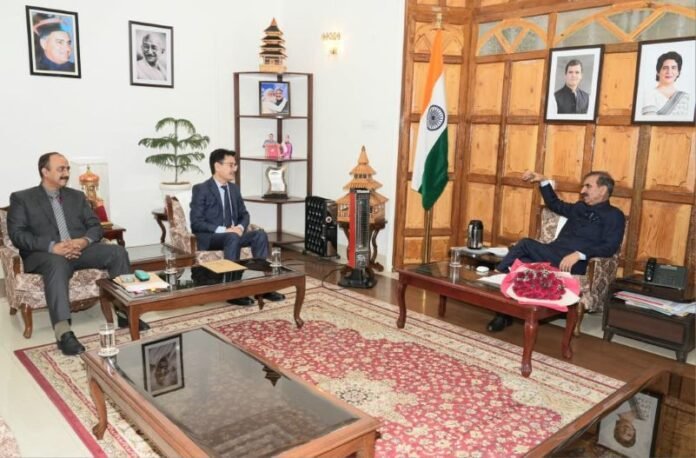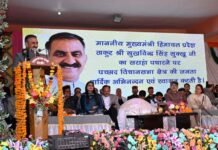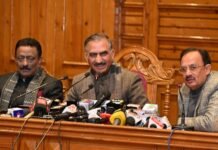Himachal Pradesh Chief Minister Thakur Sukhvinder Singh Sukhu has called for the formulation of separate norms for hill states in state-wise allocations made by the National Bank for Agriculture and Rural Development (NABARD). Meeting Deputy Managing Director of NABARD, Goverdhan Singh Rawat, at his official residence Oak Over, the Chief Minister emphasized that hilly regions face challenges distinct from the plains, and therefore require a different set of parameters for resource allocation.
The Chief Minister underlined that while NABARD has played a pivotal role in strengthening coordination between its Regional Office, State Government, and Head Office, there is a need for structural reforms to ensure hill states like Himachal Pradesh receive adequate and fair support. He highlighted that criteria such as forest cover, ecological contributions, and greening initiatives should form the core benchmarks while deciding state allocations, as these directly reflect the developmental and environmental realities of mountain regions.
Mr. Sukhu pressed for NABARD to include ground-mounted solar projects under the ambit of the Rural Infrastructure Development Fund (RIDF). Such projects, he said, could be transformative, enabling Panchayats to achieve energy self-sufficiency while advancing the State Government’s ambitious vision of Green Himachal. Additionally, he requested that electric buses be brought under RIDF funding to accelerate clean mobility in the state’s challenging terrains.
The Chief Minister also sought NABARD’s assistance in creating seamless supply and value chains in Fisheries and Animal Husbandry, extending from farm gates to consumers. This, he stressed, would directly contribute to enhancing farmers’ incomes and provide rural communities with more sustainable livelihoods. Pointing to outdated practices, he called for reforming rigid procedures by delegating greater flexibility to state governments, enabling them to introduce project-specific changes during the execution of NABARD-supported schemes.
NABARD officers, during the discussions, flagged issues surrounding the functioning of cooperative societies, particularly restrictions posed by Section 118, and suggested assigning the task of milk procurement to Primary Agriculture Cooperative Societies (PACS) rather than creating parallel entities. They also recommended speeding up the computerization of PACS to strengthen efficiency and transparency.
Mr. Sukhu assured that these inputs would be examined carefully and integrated into the state’s development strategies wherever practical. He reiterated the government’s commitment to supporting innovative models that advance sustainable growth, rural prosperity, and environmental conservation. In response, NABARD officials confirmed that the Chief Minister’s suggestions would be escalated to the highest levels and efforts would be made to incorporate them into future guidelines.
The demand for separate norms for hill states is seen as timely and essential. Unlike plains states, Himachal Pradesh invests significantly in maintaining forests, ensuring water security for the nation, and adopting eco-friendly development models. These efforts, however, often come at the cost of slower industrial growth and fewer revenue-generating avenues. Tailored NABARD allocations would therefore bridge this gap, empowering the state to balance its ecological responsibilities with economic aspirations.
By pressing for reforms in NABARD’s approach, Himachal Pradesh is not only advocating for its own needs but also setting a precedent for other hill states across India. If accepted, this policy shift could accelerate infrastructure development, renewable energy adoption, and cooperative empowerment, while ensuring that the unique geographies and ecological contributions of hilly states are duly recognized.
#HimachalPradesh #NABARD #SukhvinderSinghSukhu #GreenHimachal #SustainableDevelopment





